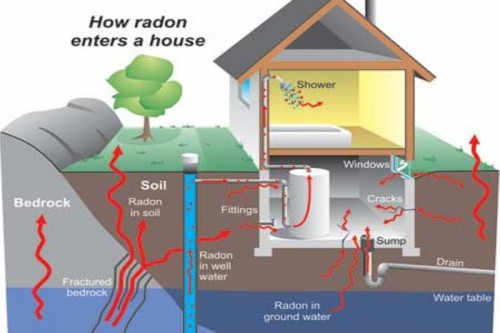Radon is a Cancer-Causing, Radioactive Gas
Radon is not something you can see, smell or taste, but it may be a problem in your home or a home you are planning to purchase or sell. It is a naturally occurring radioactive gas formed by the breakdown of uranium and radium in the local soil, rock and water. It can get into any type of building, including homes, offices and schools, but an individuals greatest exposure is at home where most people spend the majority of their time. Radon typically moves up through the ground and into a home through cracks and other holes in the foundation. The home then traps the Radon inside, where it can build up. Any type of home can have a Radon problem, including old homes and new homes, well sealed or drafty homes, and homes with or without basements. In fact, nearly 1 out of 15 homes in the U.S. are estimated to have elevated Radon levels.
According to the US Surgeon General, Radon is the second leading cause of lung cancer in the United States today, and is attributed to many thousands of deaths per year. Only smoking causes more lung cancer deaths, and smokers living in a home with high Radon levels face even higher risks.
Is Radon a Problem in New Jersey?
Radon can be found all over the United States, including most of New Jersey. The only way to know the Radon level in a home is to have it tested. The Environmental Protection Agency and the Surgeon General recommend testing all homes for Radon. Even homes without basements have been found to have unsafe levels of Radon. Homes that have been previously tested or have an existing Radon treatment system should be retested every two years to verify results.
Can a Radon Problem be fixed?
The good news is that even very high levels of Radon can be reduced to acceptable levels, but remediation requires technical knowledge, special skills and State Certifications. The cost of making repairs to reduce Radon depends on how your home was built and the extent of the problem, but most home can be fixed for about the same cost as other common home repairs.
So How Do You Test the Radon Level in a Home?
In New Jersey, home owners can test their own homes using commercially available Radon test kits. When testing as part of a real estate transaction, the New Jersey Department of Environmental Protection requires that a certified Radon Measurement Technician place and retrieve the Radon test device. True Spec Home inspections can perform this service in conjunction with a home inspection or as a standalone service. For more information about Radon and its associated risks, check out the documents found on the right side of this page, or call True Spec Home Inspections at (732) 903-8002.
Trust True Spec for all Your Home Inspection Needs


